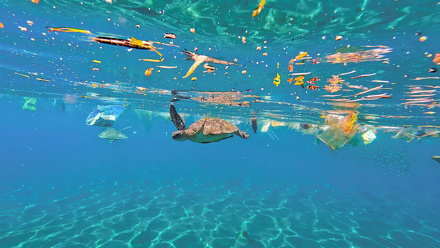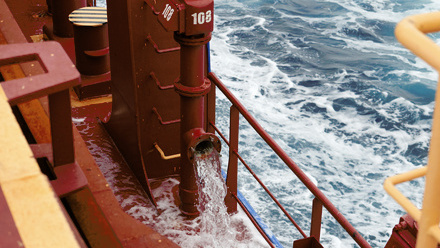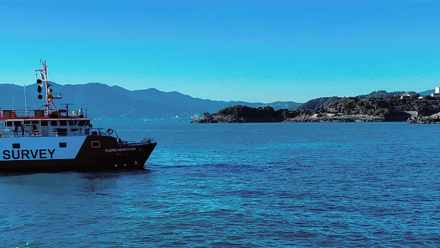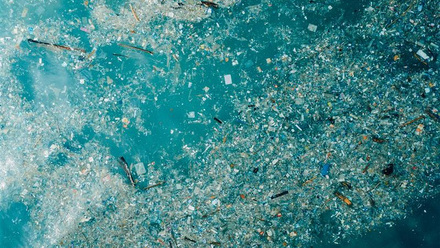Managing plastics in the yachting sector
The Ocean Plastics SIG is conducting a cross-industry investigation of ways to improve plastic use and disposal across different marine industries. The members of the SIG are aiming to interview a variety of industry experts and produce a series of short articles for the website that will discuss key issues around how organisations across the marine sector are working towards reducing plastic consumption and improving waste disposal, the key challenges they are facing, and attitudes towards responsibilities for plastic waste.
This series will invite and report on input from different sectors of the marine industry, such as fishing, leisure, commercial shipping, offshore renewables and even defence, to provide information about their approaches to plastics. Each article will focus on one industry. The objective of this activity is to provide an overview about the marine plastics situation and identify areas of concern that should be addressed and potential actions that can be taken. This report discusses the SIG’s views on the yachting industry with regards to managing plastics.
Based on interviews with representatives from across the industry, this report explores how businesses are approaching the problem of plastics and also looking at what advice on best practices they can share. The following guests from the yacht industry participated in the discussion;
- Angus Johnston, Ecoworks Marine (supplier of environmentally friendly cleaning materials)
- Paul Gullet, Wave International (marine environmental and technical filtration specialists)
- David Gates, Superyacht Rubbish (supplier of garbage processing equipment)
- Kate Fortnam, The Green Blue (Royal Yachting Association and British Marine joint environmental awareness program)
- James Scott-Anderson, British Marine (UK trade association)
Exploring the Yachting Industry
Social responsibility throughout the supply chain
For the yachting industry packaging tends to be a key source of plastic waste, whether from food products, cleaning materials or even onboard equipment. Many manufacturers and suppliers that sell to superyachts recognise the challenges presented by marine plastic litter. In many cases plastic packaging is needed because of its lightweight, strength and durability properties but there is certainly an awareness of the problems posed by plastic as well as the value their customers see in seeking ways to address the issue.
At present there is no viable alternative to the use of plastics for their packaging but some companies are starting to look at the options available reduce the impact they are having. Some specific examples from the interviews included; Ecoworks Marine use of concentrate products for their cleaning products to reduce the overall amount of packaging required, and launching a new scheme for refill stations where customers can top-up the cleaners without needing new packaging; and Wave International whose filter cartridges are currently supplied packed in cardboard but with a film wrapping and a view to replacing the film wrapping with paper in future.
Some companies consider they have a responsibility all the way through to options for the afterlife of the plastics they use. Selection of plastic is a key focus at the moment to help consumer concerns by providing packaging with HDPE2 (high density polyethylene) that can still fulfil the durability and strength requirements, but it can be recycled up to ten times and is manufactured with a high proportion of recycled plastic.
Alternatives to the use of plastics such as glass have been considered but other environmental considerations have to be taken into account such as the carbon footprint from production and transport. Bioplastics may be a possibility in the future but are not viable at present.
Micro-plastics are currently gaining more attention in any shipping/boating related industry with regards to grey and bilge water discharge. Both types of discharges contain micro-plastics and micro-biomes with grey water containing the majority of micro-plastics. Filters are very effective at the removal of these, but cleaning and disposal still then needs to be considered. This has now become a major part of the business. There are currently no regulations covering the discharge of micro-plastics in grey or bilge water. It is anticipated that the EU Water Directive will be updated to include requirements covering micro-plastics. If this happens hopefully this will then be reflected in equivalent marine legislation by the EU and eventually prompt action at the IMO level.
Raising awareness in ths industry
Feedback from yacht crew and observations whilst visiting yachts has identified a number of concerns:-
- Crew have good intentions to recycle and diligently segregate rubbish accordingly but then see the sorted waste going into a single waste stream when it is landed.
- Many yachts have drinking water systems enabling the supply of drinking water from taps and fountains and whilst this will be used by the crew it is common that guests will request and be supplied with bottled drinking water.
- Marinas are generally poorly organised in terms of waste disposal and commonly signage is lacking or unclear. In contrast, shipyards and refit facilities tend to handle waste very well with strong waste management, excellent signage and traceability of waste. A limiting factor in these cases can actually be the capabilities of the local municipality.
Education is preferred to legislation. If legislation is implemented the incentive will be to do the absolute minimum required to comply with the requirements. To be effective, if legislation is introduced it must be monitored and enforced where necessary. Education is a powerful tool to engender a culture of responsible management but the tools need to be relevant and accessible. For example, providing multilingual signage in marinas can help to direct behaviours and support local needs. Simple, actionable steps are needed to successfully engage people on a large scale, as well as encouraging transparency on where waste ends up to help minimise its impact.
Yachting associations have identified key areas to focus education campaigns including; facilities available at marinas, alternatives on board and ashore, and waste holding for smaller vessels.
This theme on education echoes some of the key messages from the UN Ocean Decade which set out an Ocean Literacy Framework aiming to evolve education tools from only being applied in formal education and training contexts to a tool and an approach for society as a whole, aimed at triggering actions towards ocean sustainability. Ocean literacy is an understanding of the ocean's influence on you and your influence on the ocean – encouraging yachting crews to better understand impacts of plastic pollution and best practices will help to bring about a change in improving management.
Initiatives, existing and planned include:-
- UK Marine Environmental Facilities Map, online directory in map format providing details of facilities available at marinas.
- Green Blue Business Directory, whilst not focussing on plastics this provides a platform for companies addressing their impact on the environment.
- Single use plastic free accreditation for marinas, centres, chandleries etc. This will start in the Solent using volunteers to assess sites with plans to expand across the UK.
- Superyacht Rubbish plans to start a Clean Superyacht Marina campaign which will document and make available to yachts details of the facilities available in marinas for the disposal of rubbish. This will enable yachts to make informed choices about their selection of marinas and hopefully prompt marinas to improve the facilities they have for waste disposal.
Conclusion
In looking at the yachting industry it is clear that there is a high level of awareness about the problems with plastics, it is also evident that there is great enthusiasm to address this and in particular its encouraging to see that manufacturers and suppliers are actively promoting and seeking ways to reduce the impact of plastics in their operations.
A common factor that has been identified is a concern about the capabilities of marinas to correctly handle waste that is landed. There is a perception that best efforts to segregate waste can wasted if all landed waste enters a single disposal stream. Superyachts potentially have great influence because of how much they spend. If they start to avoid marinas because of poor facilities it could have an economic impact and encourage improvement.
Superyachts pay attention to what their peers are doing, there is potential that good examples could encourage and support others to follow.
The next steps for the SIG will include inviting guests from another marine industry, looking at the same core questions and any industry-specific issues. As we review more industries we will consider patterns and opportunities for lessons learned across industries. If you have any thoughts on the use and disposal of plastics in the yachting sector please keep the discussion going in our Nexus group online. If you would like to get involved with this SIG or have suggestions for industries you would like to be included then please let us know.






